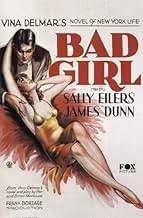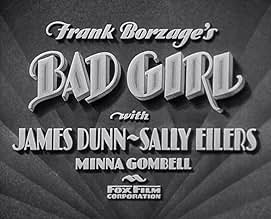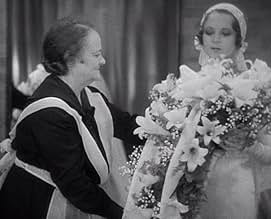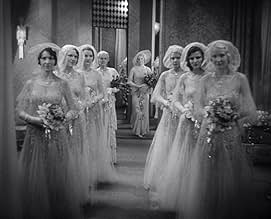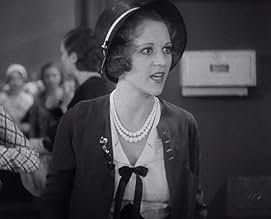IMDb RATING
6.4/10
1.7K
YOUR RATING
Two adolescents fall in love and are wed, but misunderstandings born from a lack of trust and communication haunt their marriage.Two adolescents fall in love and are wed, but misunderstandings born from a lack of trust and communication haunt their marriage.Two adolescents fall in love and are wed, but misunderstandings born from a lack of trust and communication haunt their marriage.
- Won 2 Oscars
- 2 wins & 1 nomination total
Frank Austin
- Upstairs Tenement Neighbor
- (uncredited)
Irving Bacon
- Expectant Father
- (uncredited)
William Bailey
- Expectant Father of Twins
- (uncredited)
Sue Borzage
- Unknown
- (uncredited)
Jesse De Vorska
- Expectant Father
- (uncredited)
Bud Eilers
- Man Outside Candy Shop
- (uncredited)
Edward Hearn
- Male Nurse
- (uncredited)
Aggie Herring
- Seamstress
- (uncredited)
Claude King
- Dr. Burgess
- (uncredited)
Louis Natheaux
- Mr. Thompson
- (uncredited)
Sarah Padden
- Mrs. Gardner
- (uncredited)
Lorin Raker
- Male Nurse
- (uncredited)
Storyline
Did you know
- TriviaWilliam Pawley played the role of Dorothy's brother in the stage version, and reprises his role here in the film.
- GoofsAt 2:54, shadow of boom mic is visible across Dot's face.
- Quotes
Dorothy Haley: I gotta go upstairs now. You see, my mother's dead, and my brother's boss of the house. He gets sore when I stay out late. You know, he's careful for me. But as Edna says, you can't watch a girl hard enough to keep her good if she don't want to be.
- ConnectionsAlternate-language version of Marido y mujer (1932)
Featured review
A wildly uneven film that seems as confused as its marketing. The pre-Code era was known for salacious titles and advertisement, but I don't think I've ever seen a film more at odds with its poster. I'm not kidding, these are the words underneath the poster of the main character (Sally Eilers) leaning back with her ukulele:
EVERYBODY KNOWS THIS GIRL There's one in every town Tumult in her heart. She wanted things. Clothes. Boy friends. Fun. Gayety. Kisses. * Red-lipped shop girl in sleazy dress, Aching with suppressed emotions ... dance halls ... excursion steamers ... chop suey palaces ... Coney Island ... clinging farewells ... then back to the hall bedroom. * Drama of girls ... who love to live. Laughter of girls ... who live to love. * It's romance of the working girl ... today ... your most dependable patron.
In the actual film, nothing could be further from the truth. Eilers' character is not loose, flirtatious, or even pushing on the boundaries of the role women were assigned to. We see a lot of bad male behavior though, e.g. men coming on to her (leading her to remark to her friends that all of them have just one thing on their minds), a controlling brother who hits her for coming home late (alluded to, not shown), and even the guy she's attracted to (James Dunn) doling out insults and mansplaining things. When the two marry on a whim because she fears facing her brother after coming home at 4 am (though not having had sex), he also tells her that no wife of his will be getting a job.
The best part of the film is the support she gets from her friend (Minna Gombell), a tough talking woman who stands up for her. She literally flicks her husband's chin upwards while fixing his tie, and the two part with this exchange: "Bye, Grouch" / "So long, Dizzy."
The film providing a window into the conditions women faced and the bond between friends is when it's at its best, but it's less successful afterwards. At its center this is a relationship picture, with the married couple dealing with tight finances, and miscommunicating when she gets pregnant (they both think the other doesn't want a baby). It got quite tiresome over the last half hour for me. Dunn has a weepy scene where his acting leaves a lot to be desired, then improbably offers himself up in a boxing match for money. The nurse at the hospital oddly teases Eilers' character by bringing out several different babies before giving her hers, and all of these scenes seem like filler for a film that lost its way.
As for the Oscar that director Frank Borzage won for this film, it's frankly hard to understand. It's an average film for the period, with nothing that stood out. The images of light and shadow that Josef von Sternberg captured with Marlene Dietrich in 'Shanghai Express,' on the other hand, are immortal. That year also saw so many other great efforts, e.g. Ernst Lubitsch (The Smiling Lieutenant), Rouben Mamoulian (Dr. Jekyll and Mr. Hyde), Clarence Brown (A Free Soul), Fritz Lang (M), William A. Wellman (The Public Enemy), F.W. Murnau (Tabu), King Vidor (Street Scene), Frank Capra (The Miracle Woman), and Roy del Ruth (Blonde Crazy). I usually don't like to fixate on awards and apologize for this long and pedantic laundry list, but my point is that if you're looking for a stellar film from 1931, you can do so much better than this one.
EVERYBODY KNOWS THIS GIRL There's one in every town Tumult in her heart. She wanted things. Clothes. Boy friends. Fun. Gayety. Kisses. * Red-lipped shop girl in sleazy dress, Aching with suppressed emotions ... dance halls ... excursion steamers ... chop suey palaces ... Coney Island ... clinging farewells ... then back to the hall bedroom. * Drama of girls ... who love to live. Laughter of girls ... who live to love. * It's romance of the working girl ... today ... your most dependable patron.
In the actual film, nothing could be further from the truth. Eilers' character is not loose, flirtatious, or even pushing on the boundaries of the role women were assigned to. We see a lot of bad male behavior though, e.g. men coming on to her (leading her to remark to her friends that all of them have just one thing on their minds), a controlling brother who hits her for coming home late (alluded to, not shown), and even the guy she's attracted to (James Dunn) doling out insults and mansplaining things. When the two marry on a whim because she fears facing her brother after coming home at 4 am (though not having had sex), he also tells her that no wife of his will be getting a job.
The best part of the film is the support she gets from her friend (Minna Gombell), a tough talking woman who stands up for her. She literally flicks her husband's chin upwards while fixing his tie, and the two part with this exchange: "Bye, Grouch" / "So long, Dizzy."
The film providing a window into the conditions women faced and the bond between friends is when it's at its best, but it's less successful afterwards. At its center this is a relationship picture, with the married couple dealing with tight finances, and miscommunicating when she gets pregnant (they both think the other doesn't want a baby). It got quite tiresome over the last half hour for me. Dunn has a weepy scene where his acting leaves a lot to be desired, then improbably offers himself up in a boxing match for money. The nurse at the hospital oddly teases Eilers' character by bringing out several different babies before giving her hers, and all of these scenes seem like filler for a film that lost its way.
As for the Oscar that director Frank Borzage won for this film, it's frankly hard to understand. It's an average film for the period, with nothing that stood out. The images of light and shadow that Josef von Sternberg captured with Marlene Dietrich in 'Shanghai Express,' on the other hand, are immortal. That year also saw so many other great efforts, e.g. Ernst Lubitsch (The Smiling Lieutenant), Rouben Mamoulian (Dr. Jekyll and Mr. Hyde), Clarence Brown (A Free Soul), Fritz Lang (M), William A. Wellman (The Public Enemy), F.W. Murnau (Tabu), King Vidor (Street Scene), Frank Capra (The Miracle Woman), and Roy del Ruth (Blonde Crazy). I usually don't like to fixate on awards and apologize for this long and pedantic laundry list, but my point is that if you're looking for a stellar film from 1931, you can do so much better than this one.
- gbill-74877
- Feb 27, 2020
- Permalink
- How long is Bad Girl?Powered by Alexa
Details
- Release date
- Country of origin
- Language
- Also known as
- En dålig flicka?
- Production company
- See more company credits at IMDbPro
- Runtime1 hour 30 minutes
- Color
Contribute to this page
Suggest an edit or add missing content


